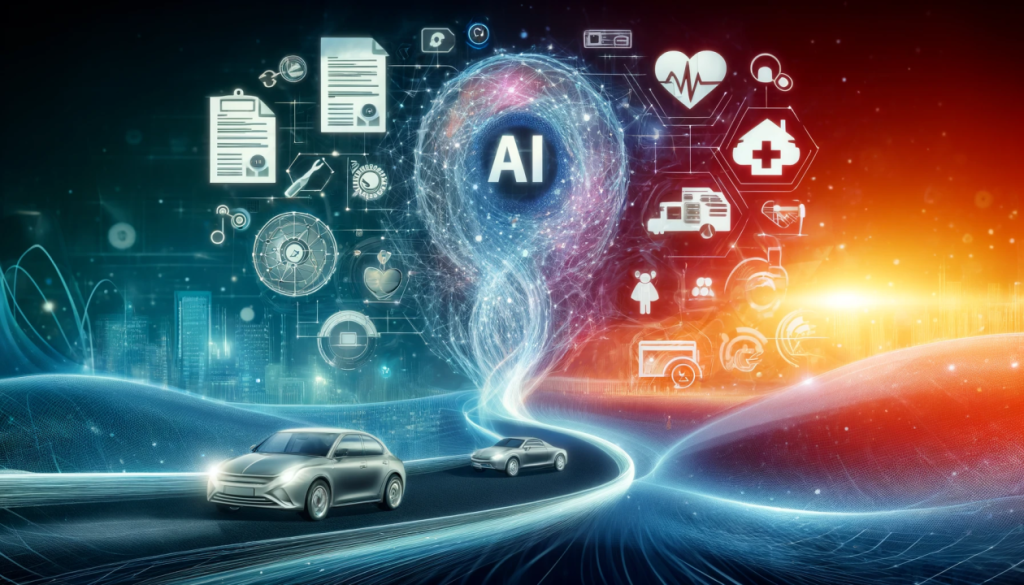AI's transformative impact on the insurance industry

- marketing
- Categories: Isidoros' blogposts
- Tags: AI, CX, Loyalty
Key takeaways from my “Tech in Insurance” podcast with Eugenia Kaffetzi.
The insurance industry, steeped in legacy systems and time-consuming processes, is experiencing a seismic shift under the disruptive force of artificial intelligence (AI). This isn’t about incremental upgrades – AI holds the key to reimagining the core functions of insuranceand fundamentally altering the customer experience.
Picture an industry where claims are resolved in near real-time, policies are as unique as the individuals they protect, and proactive measures help prevent risks before they turn into costly losses!

AI’s Game-Changing Influence: Business and Customer Impact
- Redefining the Claims Experience: We’ve all dealt with frustrating delays and mountains of paperwork that often accompany insurance claims. AI is poised to revolutionize this process. Instead of lengthy back-and-forth with adjusters, envision a world where AI analyzes photos or video footage to instantly assess car accident damage or home insurance claims. AI-powered automation can streamline claim approvals, accelerate payouts, and deliver a customer experience that’s both seamless and empowering.
- Risk Assessment, Evolved. Forget One-Size-Fits-All Underwriting: Traditional underwriting often relies on a limited set of demographic and historical data. AI changes the rules entirely. By harnessing the power of vast datasets, machine learning models can build dynamic, multi-dimensional risk profiles. This allows insurers to make highly informed decisions, personalize premiums to better reflect individual circumstances and open up previously inaccessible markets.
- Turning the Tide Against Fraud: Insurance fraud costs the industry an astronomical amount every year, ultimately driving up premiums for everyone. AI algorithms become your tireless fraud detectives. They meticulously analyze oceans of data, flagging patterns, inconsistencies, and connections that traditional systems and human analysts would likely miss. By safeguarding profits, AI ensures fairness for honest policyholders and helps stabilize the insurance market.
- The Future of Service. AI-Powered Empowerment: In an era of ‘always-on’ connectivity, customers demand instant, personalized support. AI-driven chatbots and virtual assistants are the solution. They work around the clock, tirelessly answering questions, guiding policy renewals, or even initiating the claims process. This unlocks a new level of efficiency, allowing human agents to focus their skills on resolving complex inquiries and building genuine customer relationships.
- Hyper-Individualized Insurance. More Than Just a Buzzword: True personalization in insurance has been elusive, but AI changes the equation. Imagine car insurance policies that adapt in real-time based on driving data collected by smart sensors, actively rewarding safe behaviors and incentivizing improvement. This level of individualization creates a win-win scenario for both customers and insurers. In the health insurance sphere, AI could empower a transition to a proactive care model. By analyzing wearable data and identifying emerging trends, AI can help insurers offer personalized guidance and encourage preventative care to minimize long-term health risks.

The Challenge of Change: Building an AI-Powered Future
The insurance industry’s transformation rests on more than just technology. It’s imperative that AI is adopted ethically and responsibly. Proactive conversations about data privacy, algorithmic bias, and the evolving workforce are essential in building trust. By addressing these challenges transparently, insurers lay a strong foundation for a future powered by intelligent, beneficial AI applications.
Focusing on the Human Element
Technology is powerful, but it’s the people behind it who make the true difference. Will you empower your teams with AI tools to enhance their skills and deliver better service? Will you champion customer-centric innovation that puts individuals in control of their insurance journey? Will you leverage AI to build trust, empathy, and genuine connection in a digital age? The future of insurance lies in the hands of its leaders and innovators. What will you build?